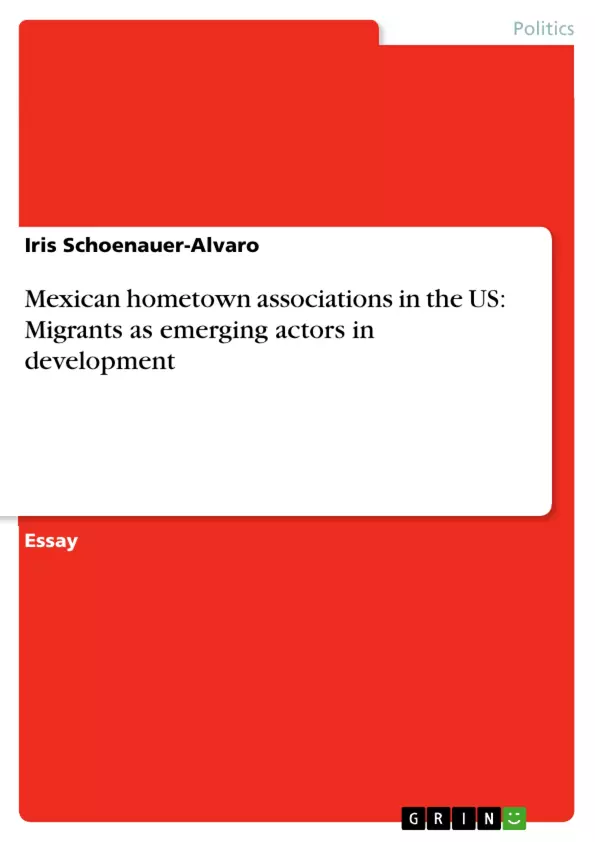Many Latin American governments are more and more interested in obtaining some benefits from the fact that an increasing number of their citizens leave the country in search of better opportunities elsewhere. In the case of Mexico, David Hernández goes as far as to state that President Fox has virtually initiated an “emigrant hunt” in order to attract valuable foreign exchange.1 Looking at it from a migrant’s perspective, there has been a long tradition of maintaining families back home by means of remittances. Within this context of remittances, a new phenomenon has emerged during the last decade: Collective remittances for development projects, which are co-financed by migrant communities and the home state. The purpose of this paper is to analyse the role Mexican Hometown Associations (HTAs) in the United States (US) play in terms of Mexico’s communal or regional development; by doing so, I will focus on the issue of collective remittances. Firstly, I will look at the purpose of Mexican HTAs and how they evolved over time; this will be followed by an analysis of the role of the Mexican government in establishing and maintaining contacts with HTAs and in performing joint projects such as fund-matching schemes for developmental purposes. Subsequently, I will analyse a case study that exemplifies such a fund-matching scheme: the “three-for-one” project of the Mexican state of Zacatecas. Lastly, I will examine the potential of transnational social movements in general and HTAs in particular with regard to the social, economic and political development of their home countries.
Inhaltsverzeichnis (Table of Contents)
- Mexican Hometown Associations in the US
- The Role of the Mexican Government
Zielsetzung und Themenschwerpunkte (Objectives and Key Themes)
This paper examines the role of Mexican Hometown Associations (HTAs) in the United States in fostering Mexico's communal and regional development. The focus is on collective remittances, exploring how these contributions from migrant communities are used in developmental projects. The paper also analyzes the Mexican government's involvement in partnering with HTAs for these purposes, focusing specifically on a case study involving Zacatecas. Finally, the paper assesses the broader potential of transnational social movements, specifically HTAs, in promoting social, economic, and political development within their home countries.
- The evolution and purpose of Mexican HTAs in the US
- The role of collective remittances in development projects
- The collaboration between the Mexican government and HTAs
- The potential of transnational social movements for development
- The impact of HTAs on local communities and their potential to alleviate migration pressures
Zusammenfassung der Kapitel (Chapter Summaries)
The first chapter examines the historical development of Mexican HTAs in the US, highlighting their evolution from informal social and self-help organizations to organizations actively involved in fundraising for development projects in their Mexican home communities. It discusses the growing number of HTAs and their shift towards productive, income-generating projects, emphasizing the potential of collective remittances for socio-economic development. The chapter also addresses the challenges of ensuring long-term development, including the reliance on migrant remittances and the need for self-sustainability.
The second chapter focuses on the role of the Mexican government in fostering relationships with HTAs and facilitating joint development projects. It explores the program "Programa de Atención a Comunidades Mexicanas en el Extranjero" (PACME), established in 1990 to connect with Mexican migrants living in the US. It also discusses other initiatives such as the Institute for Mexicans Abroad and the National Council for Mexican Communities Abroad, which aim to strengthen ties with Mexican citizens abroad and harness their potential for development.
Schlüsselwörter (Keywords)
This paper focuses on the crucial concepts of Mexican Hometown Associations (HTAs), collective remittances, transnational social movements, and development projects. It explores the role of these HTAs as emerging actors in the development of their home communities in Mexico, particularly in relation to government initiatives and the challenges of fostering sustainable socio-economic development.
Frequently Asked Questions
What are Mexican Hometown Associations (HTAs)?
HTAs are organizations formed by Mexican migrants in the US to support their communities of origin through social projects and financial contributions.
What are "collective remittances"?
Unlike individual money transfers to families, collective remittances are funds pooled by migrant groups to finance public works like schools, roads, or water systems in their home towns.
What is the "three-for-one" project in Zacatecas?
It is a fund-matching scheme where for every dollar contributed by migrants, the federal, state, and municipal governments each contribute another dollar to a development project.
How does the Mexican government interact with HTAs?
The government actively seeks to partner with HTAs through programs like PACME to attract foreign exchange and foster regional development.
Can HTAs alleviate migration pressures?
By funding productive, income-generating projects in home communities, HTAs aim to improve local socio-economic conditions, potentially reducing the need for future migration.
- Quote paper
- Iris Schoenauer-Alvaro (Author), 2003, Mexican hometown associations in the US: Migrants as emerging actors in development, Munich, GRIN Verlag, https://www.grin.com/document/112836



